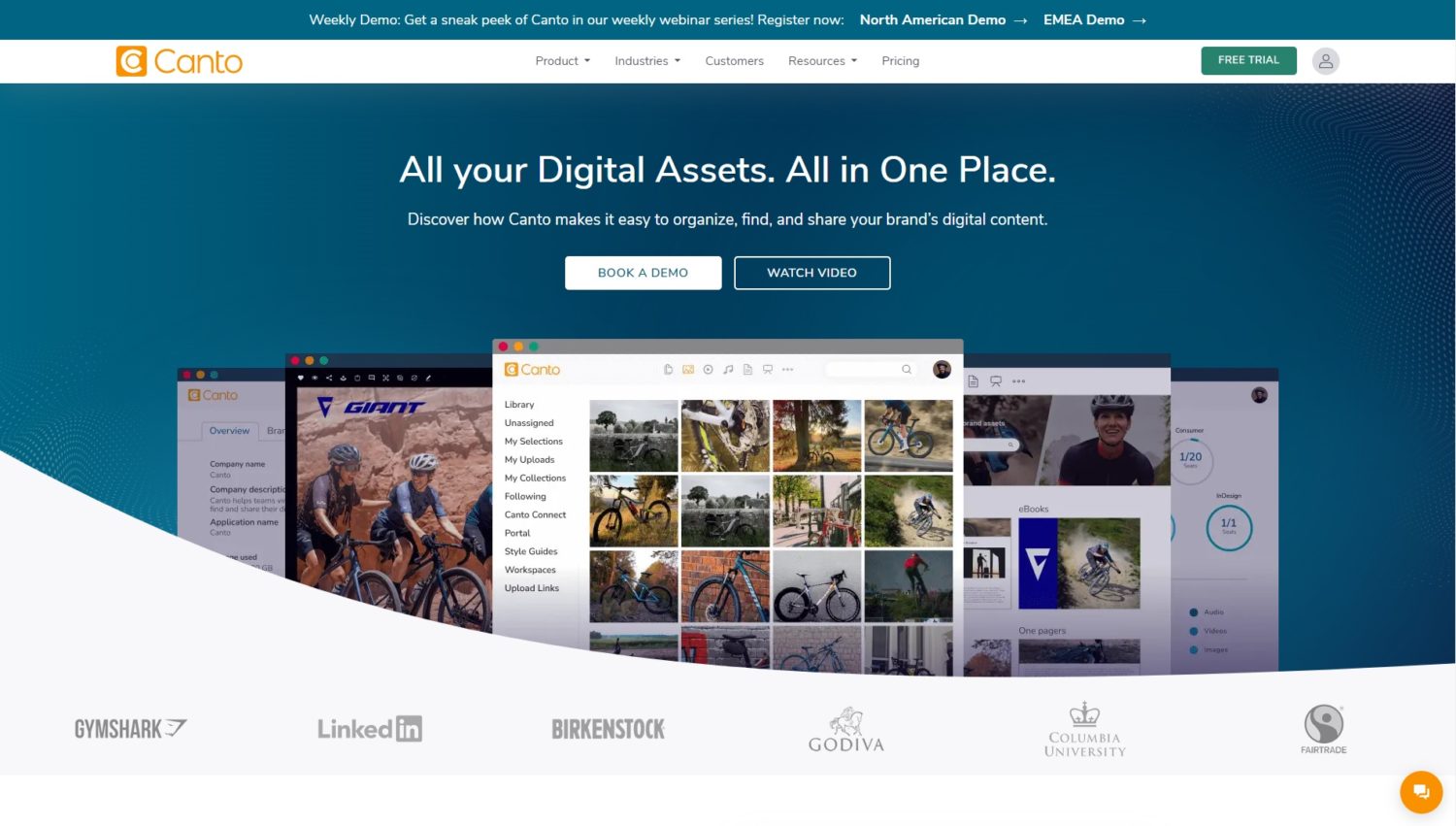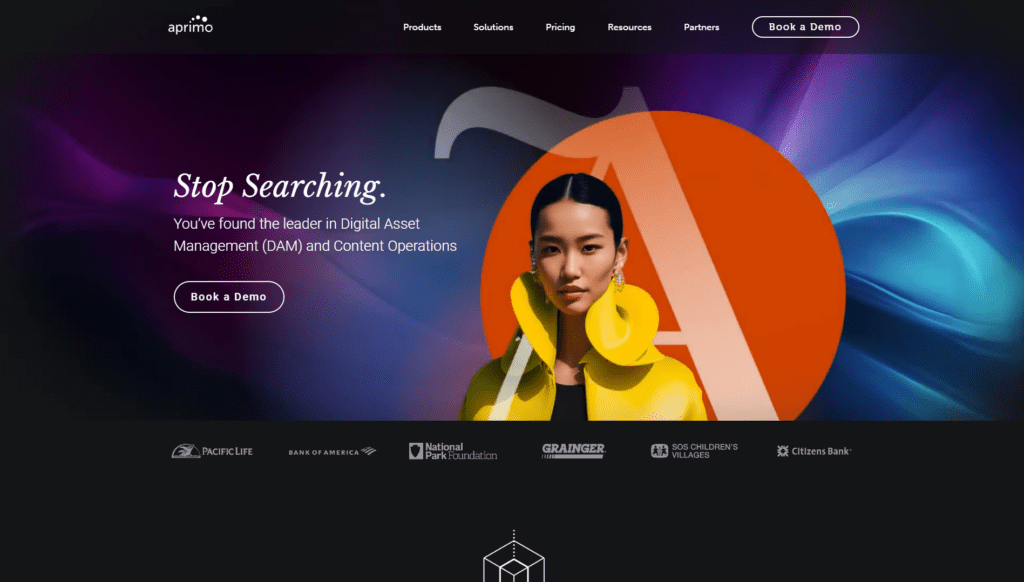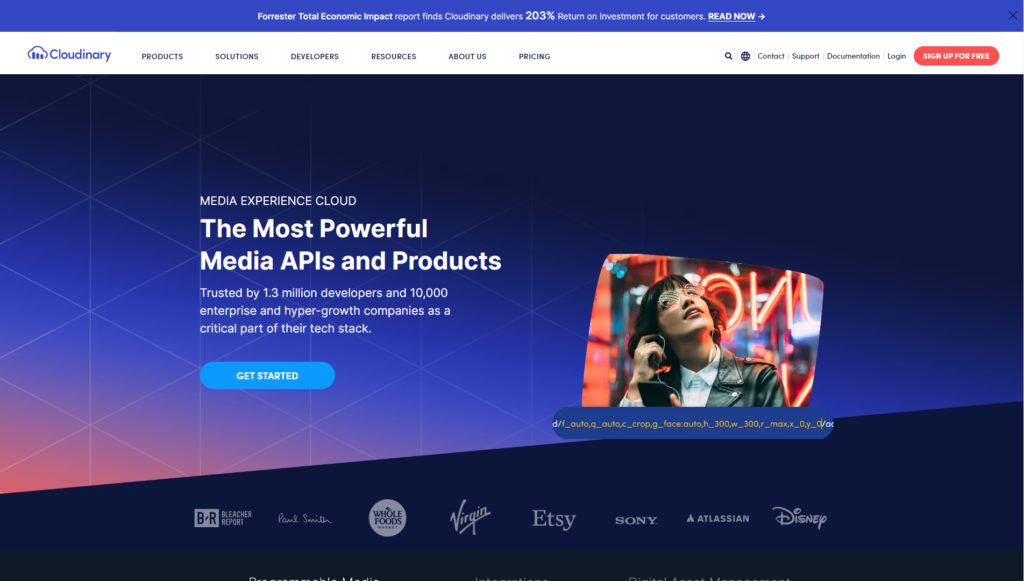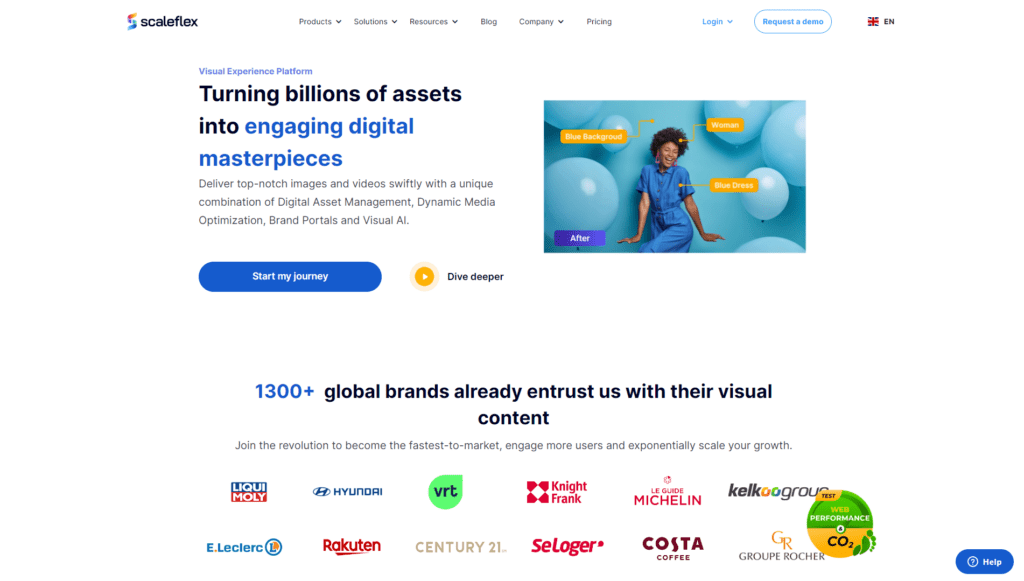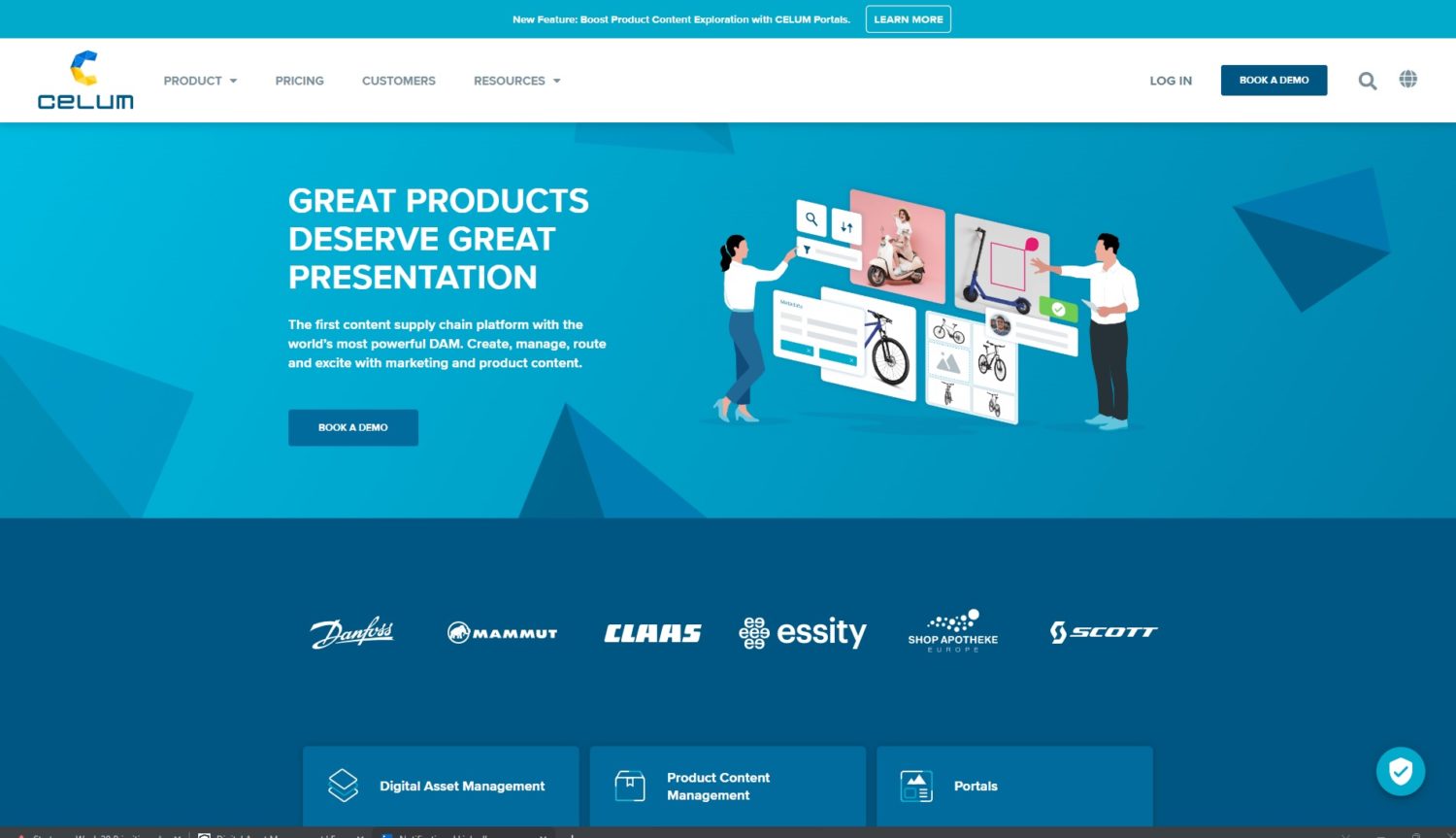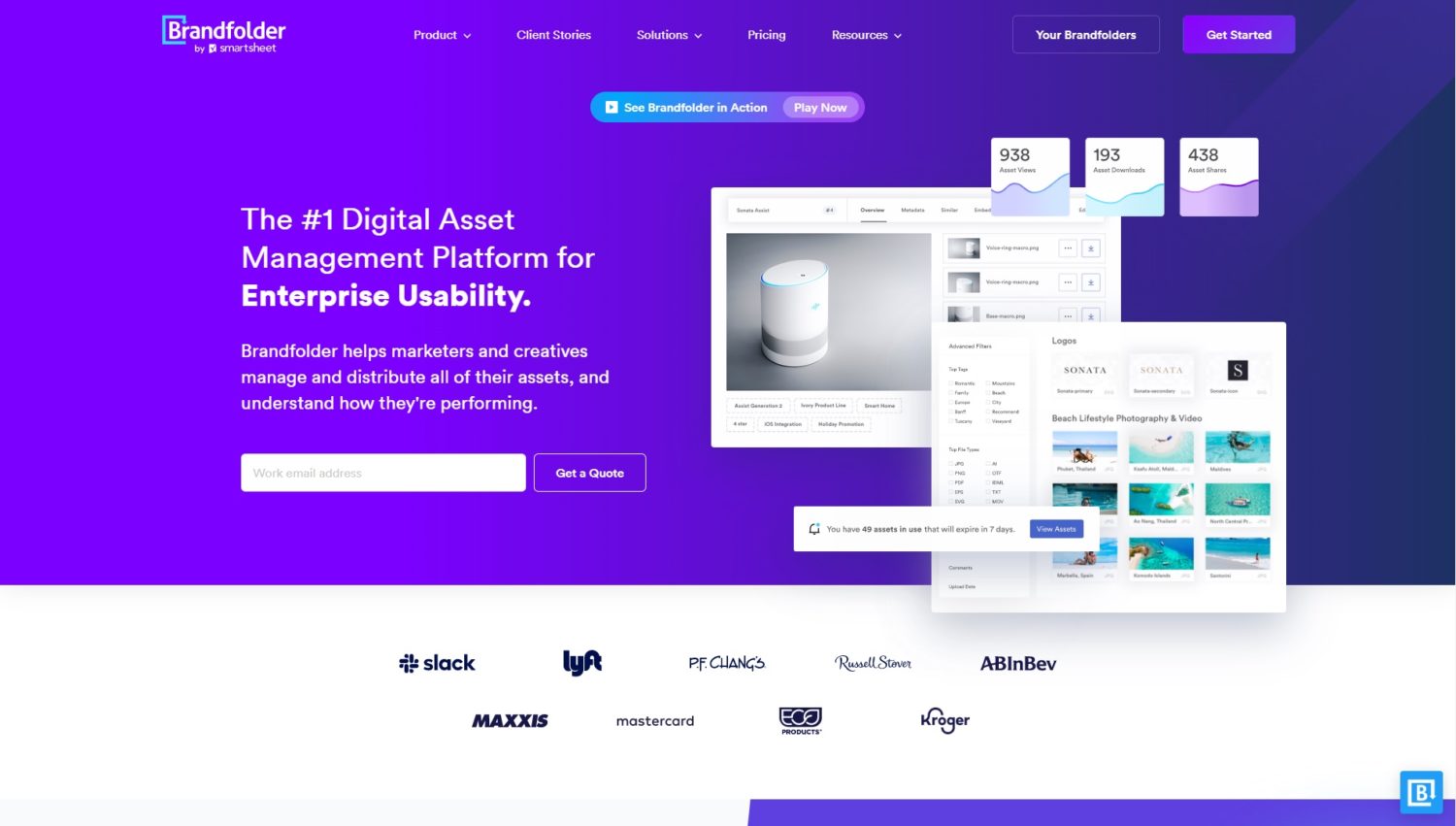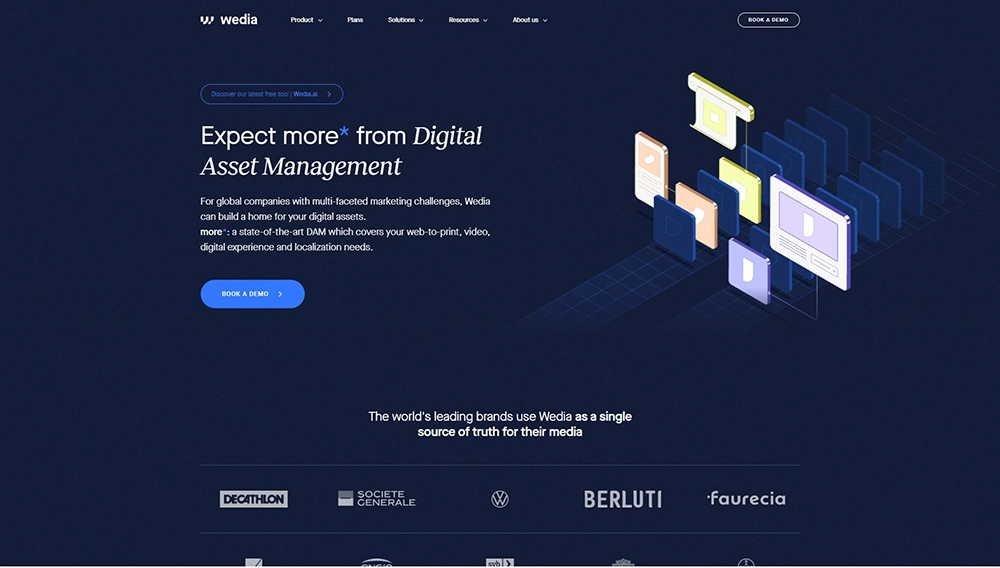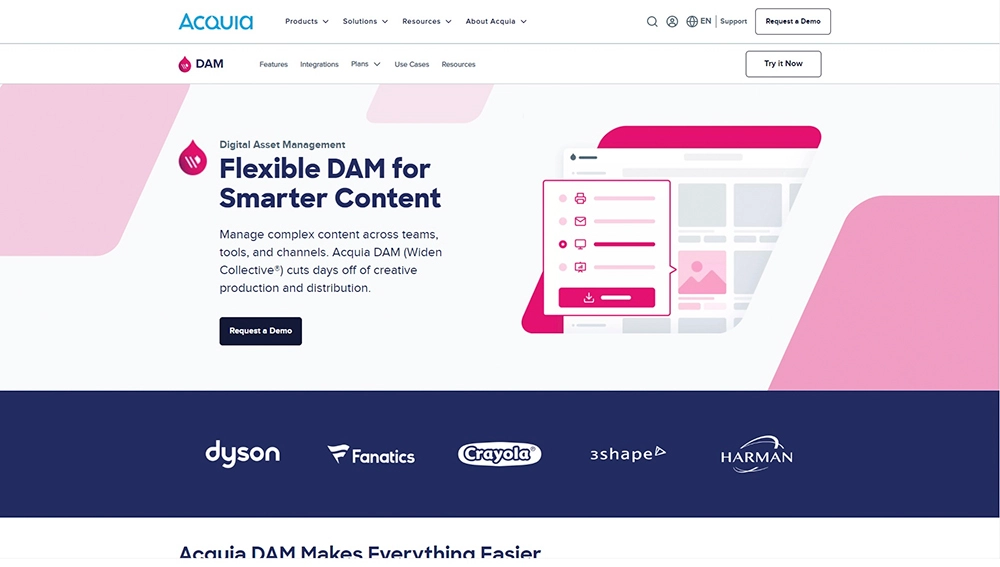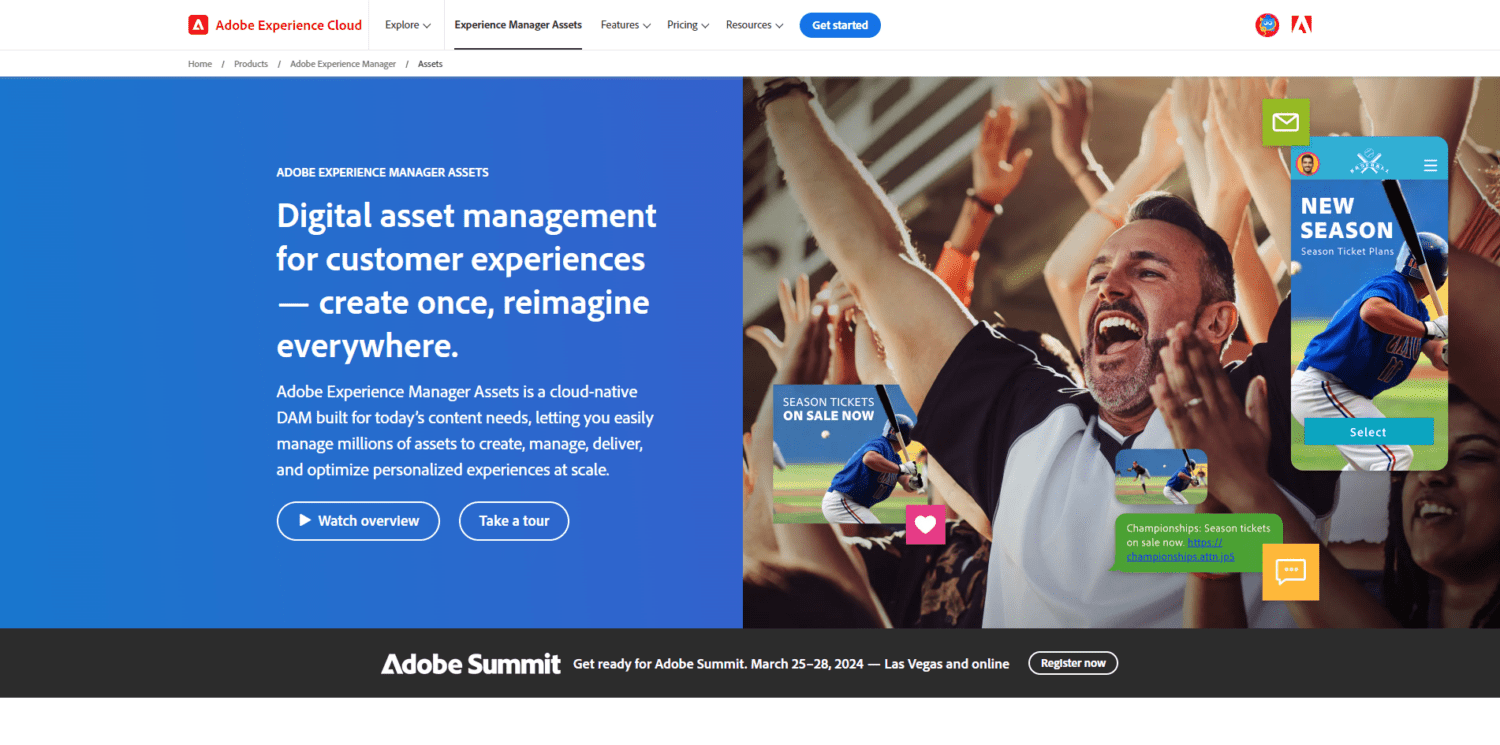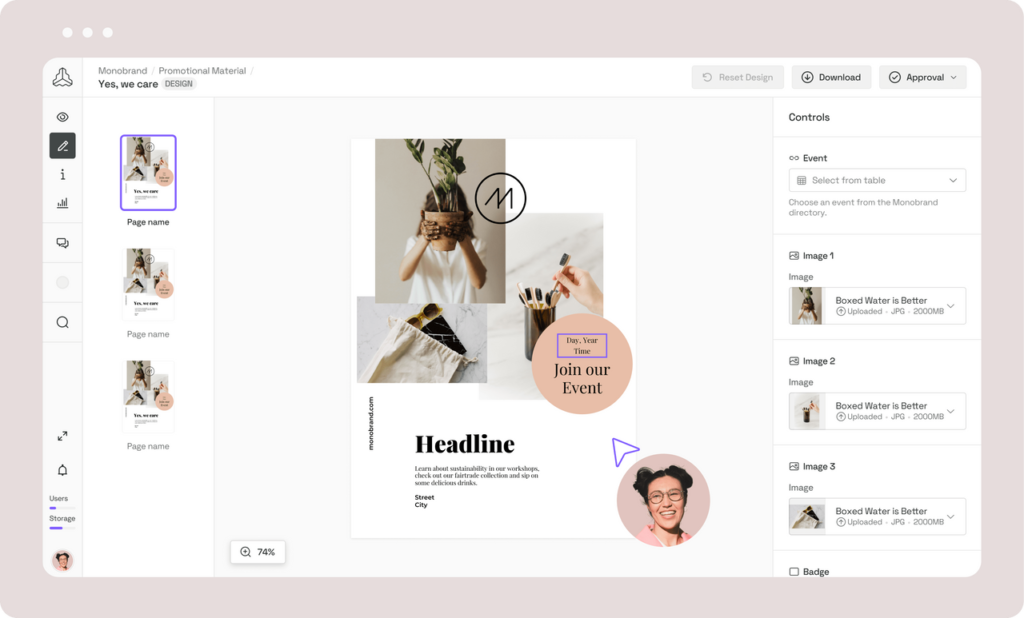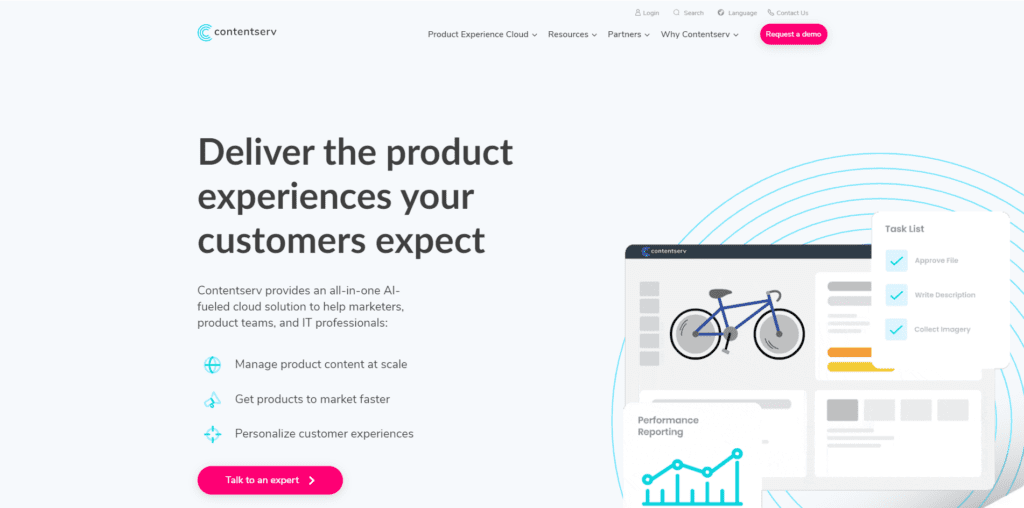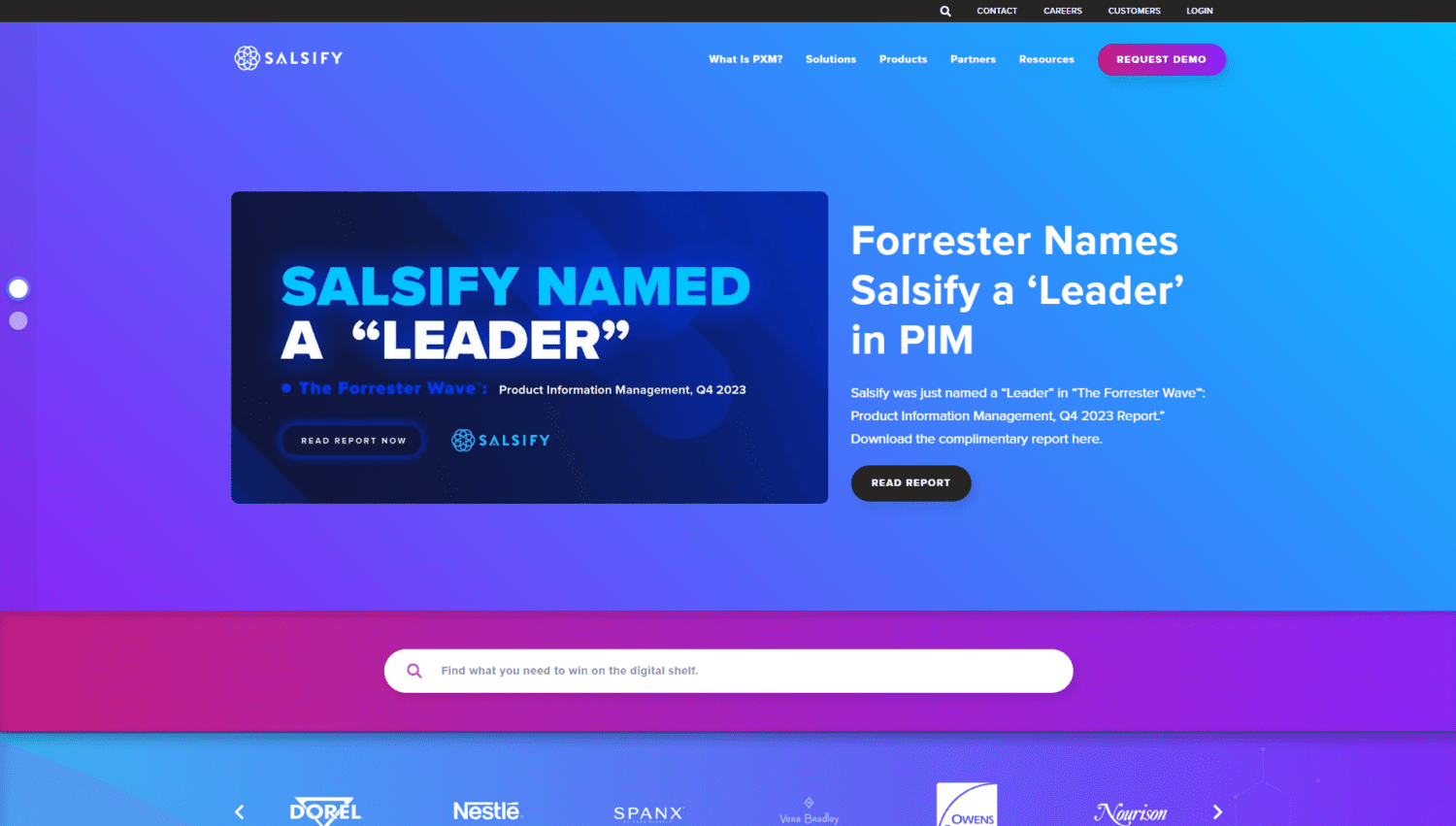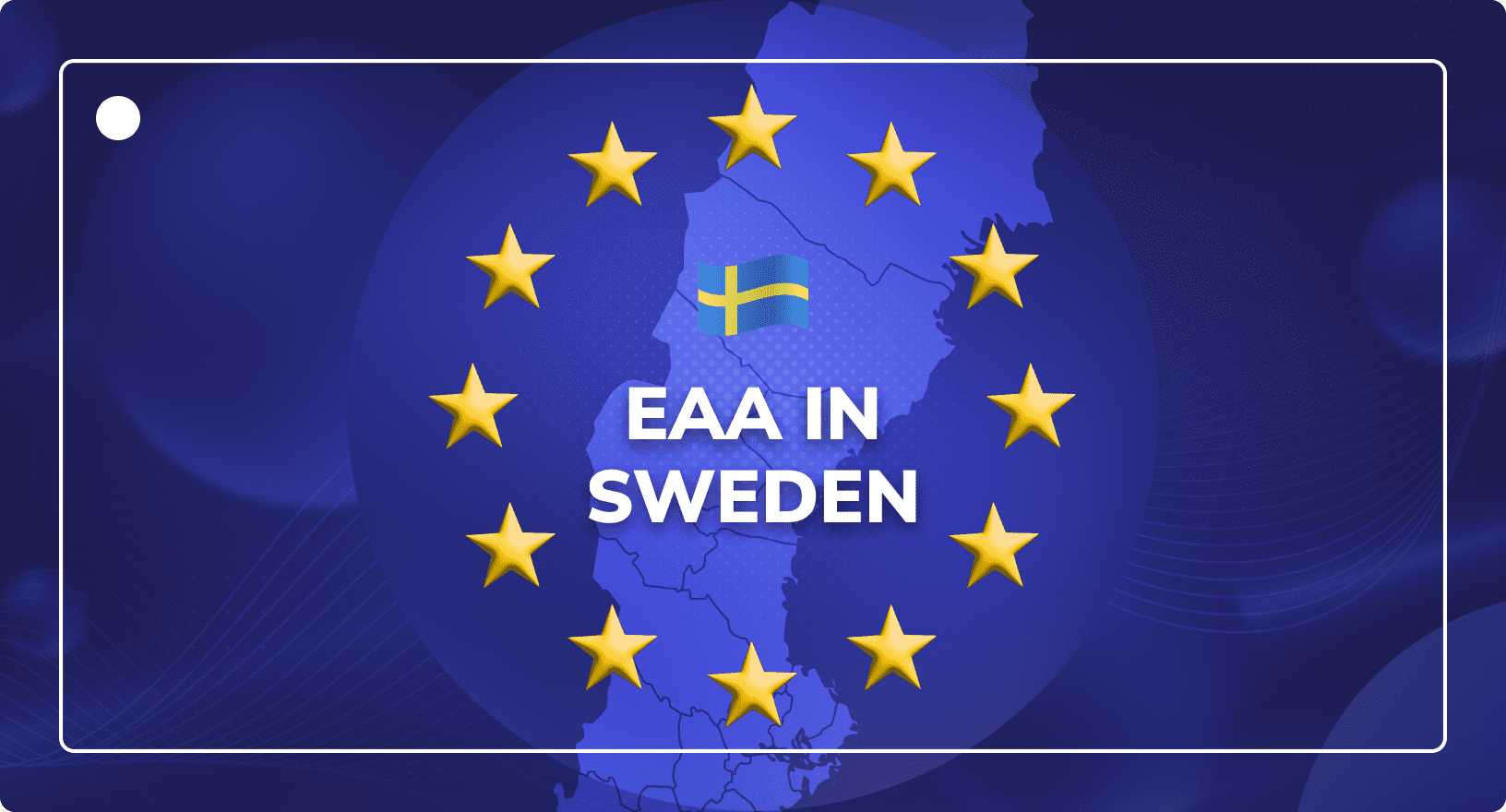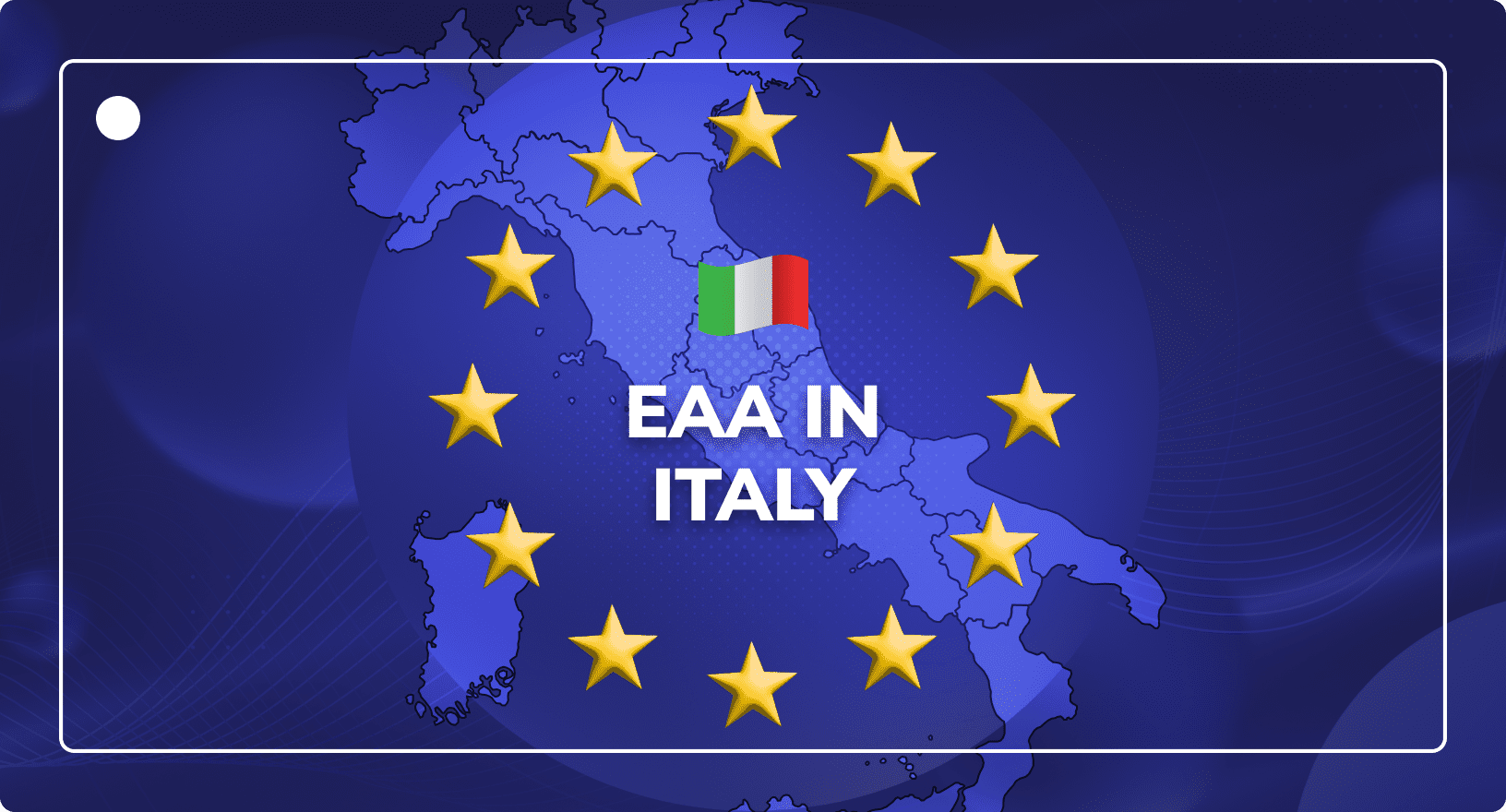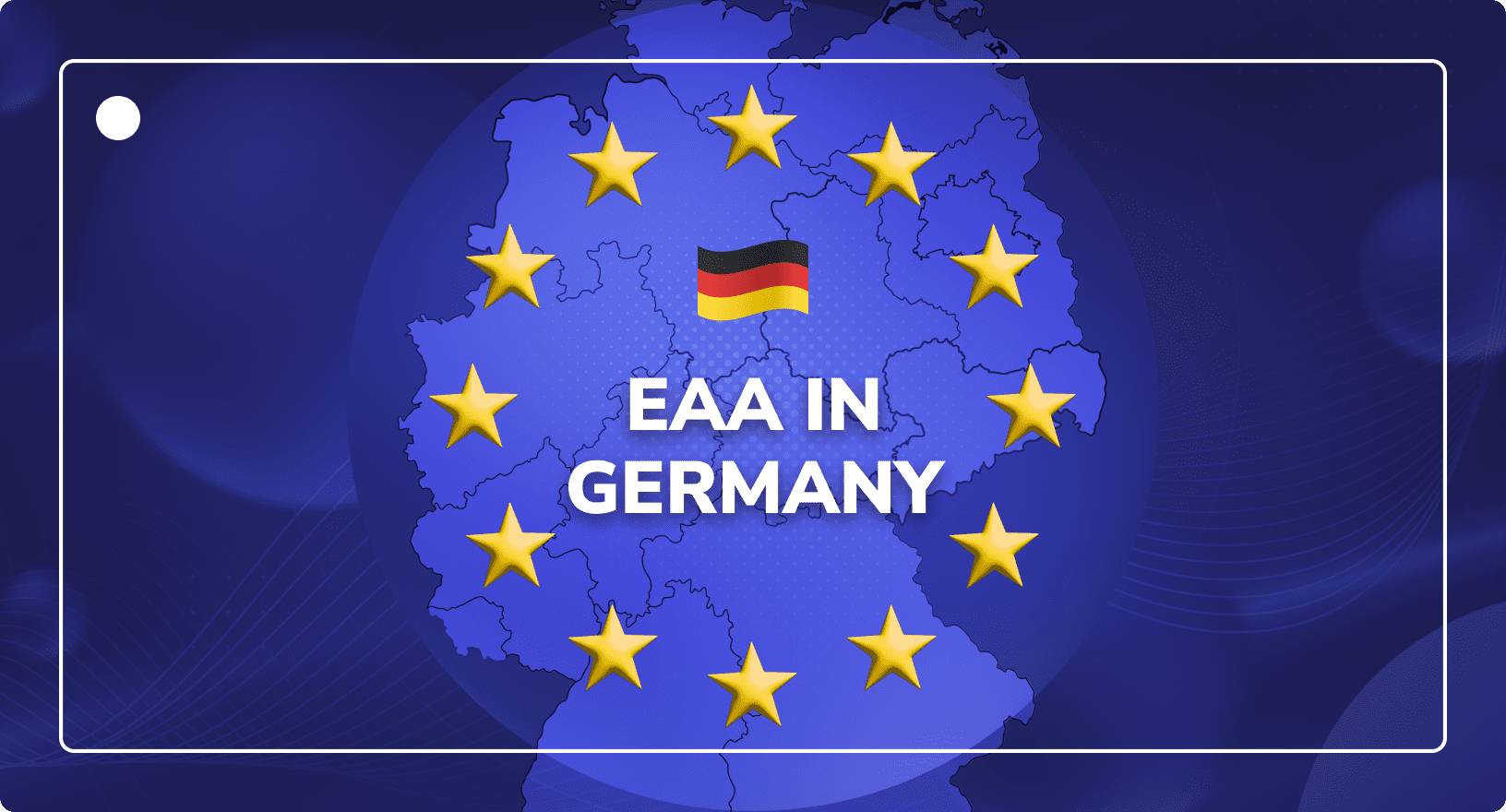The 15 Best Digital Asset Management Software Providers in 2025
Digital Asset Management
Updated on February 14, 2025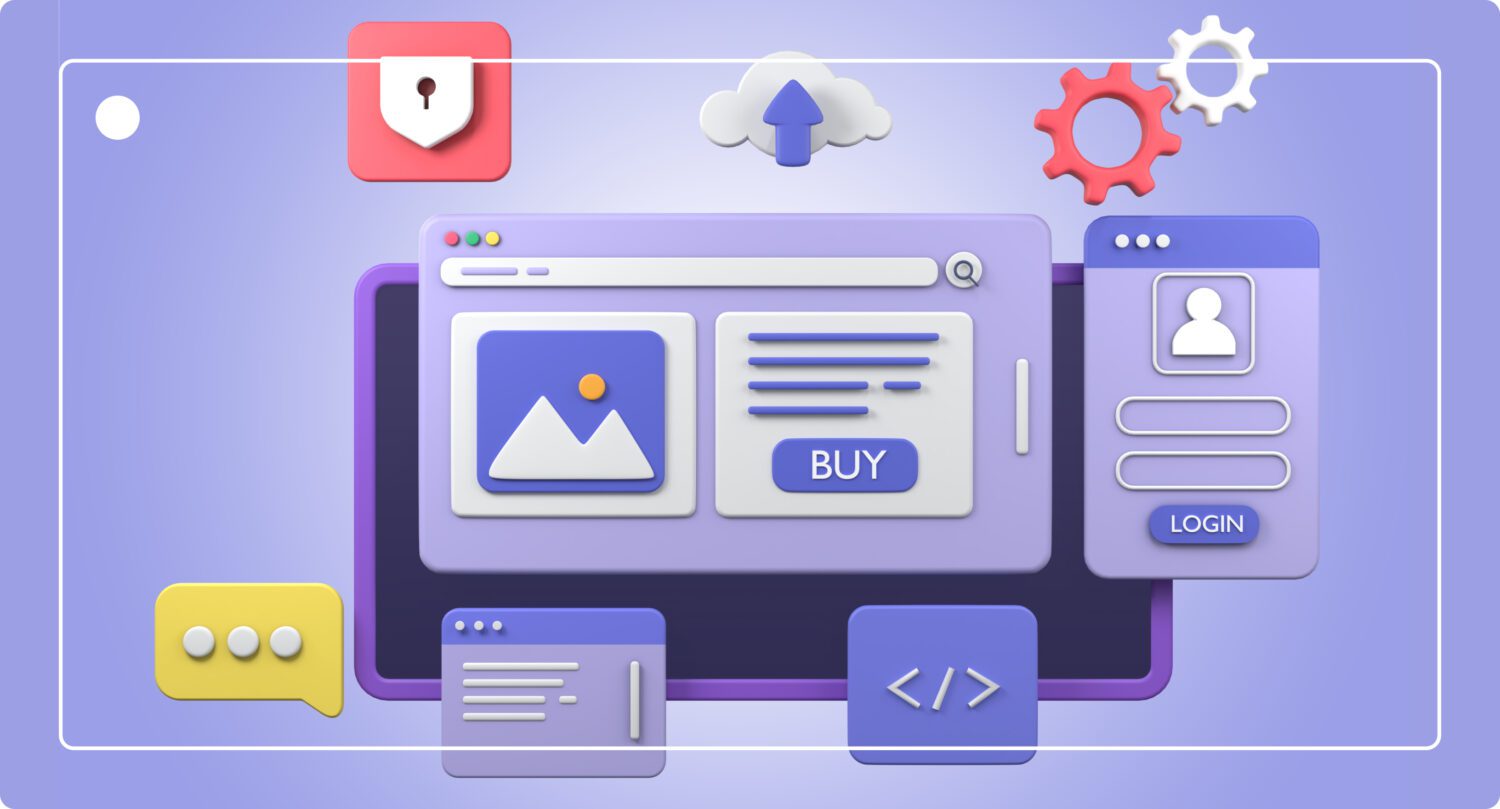
Digital asset management software has become the backbone of business in modern times. No longer are assets stored locally in massive server farms.
Now, cloud-based digital asset management systems make access to content easier than ever. Along with the increasing volume of digital content, finding the right digital asset management (DAM) software is essential.
Whether you’re a marketing team handling large multimedia files or an e-commerce business managing millions of product images, investing in a reliable DAM solution can streamline your asset management efforts and boost productivity.
In this article, we’ll explore the best digital asset management software available to help you make an informed decision based on your organisation’s specific needs.
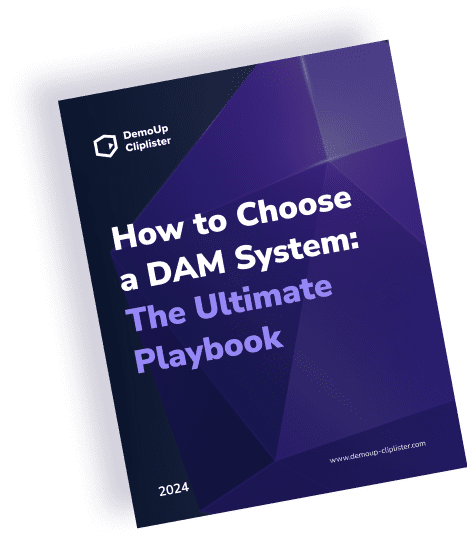
Comparing DAM Providers? Download Our Guide!
Free download nowWhat is Digital Asset Management?
Digital asset management, or DAM, refers to the process of storing, organising, and distributing digital assets in a centralised system. It involves managing various types of media files, including images, videos, audio files, documents, and more.
DAM systems provide a platform for storing, cataloguing, and retrieving these assets efficiently, enabling teams to collaborate, maintain version control, and ensure consistent branding and messaging across channels.
Top Features to Look for in a Digital Asset Management Tool
Overall, digital asset management is beneficial for businesses that want to stay organised and facilitate collaboration. With DAM, your teams can quickly and efficiently find all the files they need, when they need them.
Besides the shift to remote-first and hybrid work, teams without some sort of DAM in place struggle to keep tabs on their files. Furthermore, increased digitisation across enterprises of all sizes means companies are moving their DAM systems from old, on-premises legacy systems into the cloud.
Core Functionalities
The core functionalities of such a tool include:
- Search and Retrieval: You’ll have a structured repository for your digital assets, making it easier to search for, find and retrieve files quickly. Organising assets into hierarchies helps in effective digital asset management.
- Collaboration Features: You can facilitate seamless collaboration among team members, regardless of their location. DAM systems enable users to share and collaborate on assets, ensuring everyone has access to the right files at the right time.
- Version Control: Any DAM solution competing for the top stop must offer a way to track and recover previous asset versions. This helps you keep track of not only progress but also prevent time being wasted when new versions do not get approved.
- Customisable User Permissions: Features like access control prevent unwanted leaks, enhance security, and protect your valuable content. At the very least, you need something that allows granular access controls, so you can protect your brand and maintain consistency.
- Digital Rights Management: DRM was once a nice-to-have feature for a digital asset manager but has quickly become table stakes. All leading DAM software today comes with DRM capabilities to help you stay on the right side of licensing and compliance issues.
Advanced Capabilities
Advanced features to look for on top of basic functionality include:
- Advanced Metadata Management: Metadata tagging is how you know exactly what’s inside a file without having to open it. It helps you quickly find, organise, and categorise content based on key details, like keywords, dates, or descriptions, making it easier to manage large asset libraries.
- BONUS: Check out our guide “Best Practices for Tagging Metadata and Its Role in DAM“.
- Content Editing: Many DAMs nowadays include some sort of editing tool within them so you do not ever have to exit the platform. This saves you loads of time and energy downloading files, working on them, and reuploading the new version.
- Dynamic Media Delivery: If your DAM system is file storage, dynamic media delivery is how you get it to the end user. It ensures the right versions of images, videos, and other files is delivered quickly and efficiently, in the right format, for the right device.
- Collection Sharing: Many enterprise DAM systems allow you to organise similar assets into collections to make it easier to organise files. The ability to share these collections with key stakeholders via short-links is a more advanced take on this function.
- Content Analytics: You invest a lot of money into your assets, which is why it’s crucial to know how they’re being used and how they’re performing. On-board analytics help you identify, understand, and optimise both your content and your workflows.
Additional Considerations
Digital asset management as a function extends far beyond just marketing. It involves all departments, and as such, there are often more things to consider like:
- Integrations: A DAM is simply file storage without integrations into other systems or networks. Depending on your industry, you may need integrations into PIM systems, project management tools, ERP tools, or content approval software.
- Scalability: As your organisation grows linearly, the number of assets you generate tends to grow exponentially. Therefore you need a tool that can scale up or down in response to your changing needs.
- Ease of Use: DAM tools have a reputation for being extremely complex and hard to use. But over the past few years, this has changed significantly. Test your preferred DAM tools for intuitiveness and user-friendliness to ensure adoption. Navigation should also be simple to maximise usability.
- Security & Data Protection: The reason it’s called asset management is because the files stored in it have value. Be sure to include in your DAM RFP a requirement that your data must be stored in centres with at least ISO-27001 certification, regardless of which DAM tools you are considering.
- Pricing: Whether you are an SMB looking for pay-as-you-go pricing or an enterprise that requires bespoke fees, be sure to calculate the total cost of ownership (TCO) of a new system. This includes on-off integration fees, recurring expenses, and even maintenance projects.
As more businesses move to hybrid or work-from-home environments, the need for digital asset management software will only continue to grow. As we move toward the future, there will be more advances, features, and tools that teams can use to facilitate the creation, management, and distribution of content.
The 15 Best Digital Asset Management Systems for 2025
There best digital asset management software comes down to the size of your business, industry, and overall needs. Here are the top options:
1. DemoUp Cliplister – Best Digital Asset Management Software for E-Commerce
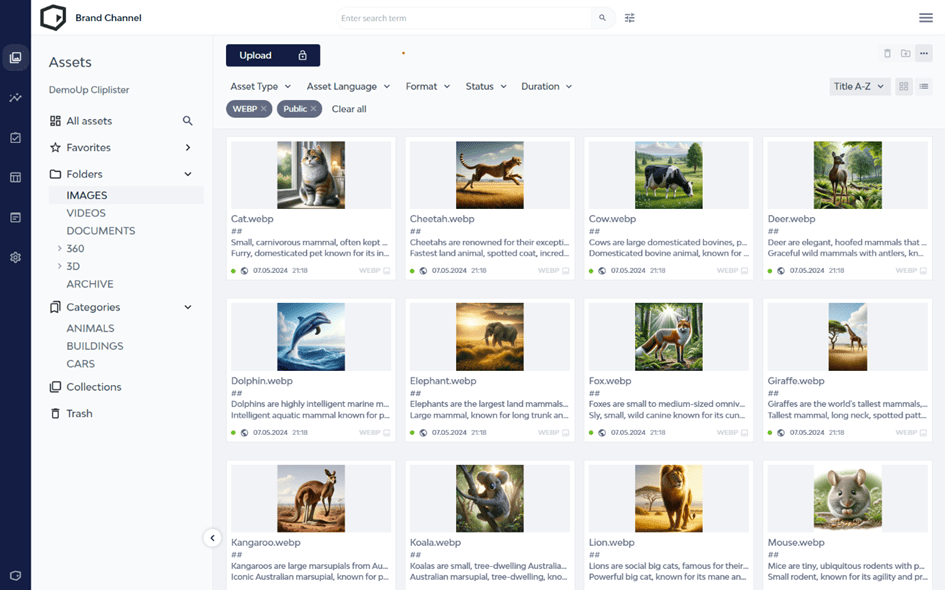
DemoUp Cliplister is a fully loaded, cloud-based digital asset management software provider focused on e-commerce content management and distribution. It comes fully loaded with everything you need to manage and deliver images, videos, and even 3D models.
Now in its fourth iteration, DemoUp Cliplister’s DAM (the Brand Channel) offers everything an e-commerce enterprise needs. From asset storage to lightning-fast search and powerful add-ons, it transforms into a full content operations engine, letting brands and online shops pick only the features they need.
However, what truly stands out and makes DemoUp Cliplister the best DAM for e-commerce is its syndication network.
Real-Time Content Syndication
DemoUp Cliplister’s DAM goes beyond asset management by automating the distribution of digital content from brands to retailers in the network. This ensures seamless and consistent delivery of product images, videos, and other assets directly to shoppers right on the product detail page.
With just a few clicks of your mouse, you can upload videos and 3D models to all relevant PDPs. It provides a much needed bridge between brands and retailers, saving both sides time, money, and effort.
Product content syndication for brands lets manufacturers publish new product videos to all relevant PDPs across the retailer network with minimal delay. This ensures consistent, up-to-date content without manual uploads, giving brands a faster, more efficient way to manage their digital assets.
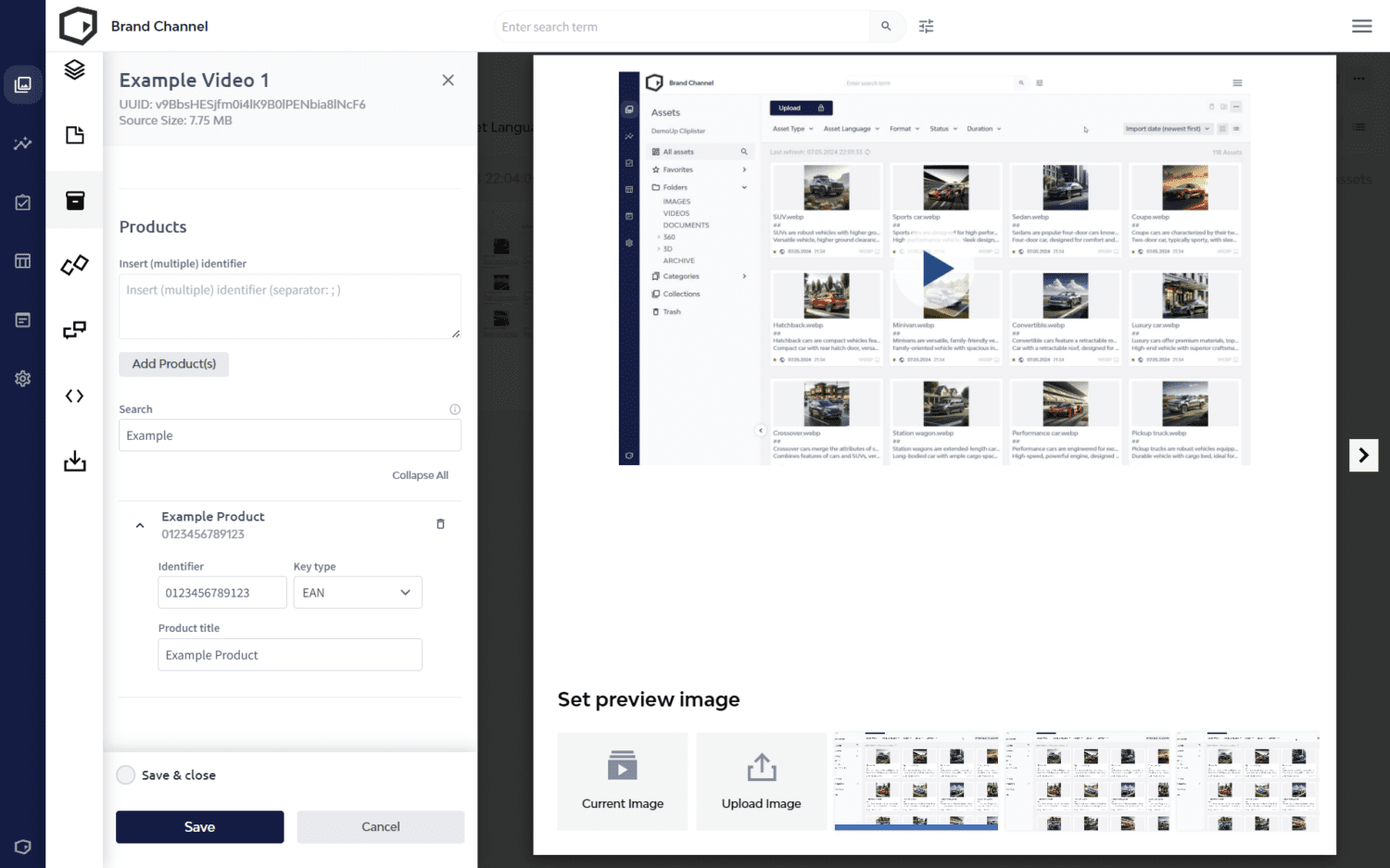
On the other side, product content syndication for retailers provides online shops with access to hundreds of thousands of brand-created videos and 3D models. All without any manual effort – an EAN matching system embeds the content into product carousels automatically with a simple script.
But that’s not all DemoUp Cliplister can offer e-commerce businesses; it’s other digital asset management features are just as powerful.
Headless Digital Asset Management Architecture
While DemoUp Cliplister provides the Brand Channel user interface, you can also access its functionality via a powerful API. This provides the flexibility to deliver digital assets across any platform or channel via APIs, decoupling the front-end from back-end systems.
While many DAM providers offer API access, they tend to be complex and require a lot of time and effort from development teams. DemoUp Cliplister’s API is developer-friendly, so you won’t waste loads of time looking through documentation or debugging.
Using the system headlessly also helps you speed up day-to-day operations. It allows you to integrate into any existing workflow, or customise new workflows exactly how you want them.
On-Board Dynamic Template & Creative Editor
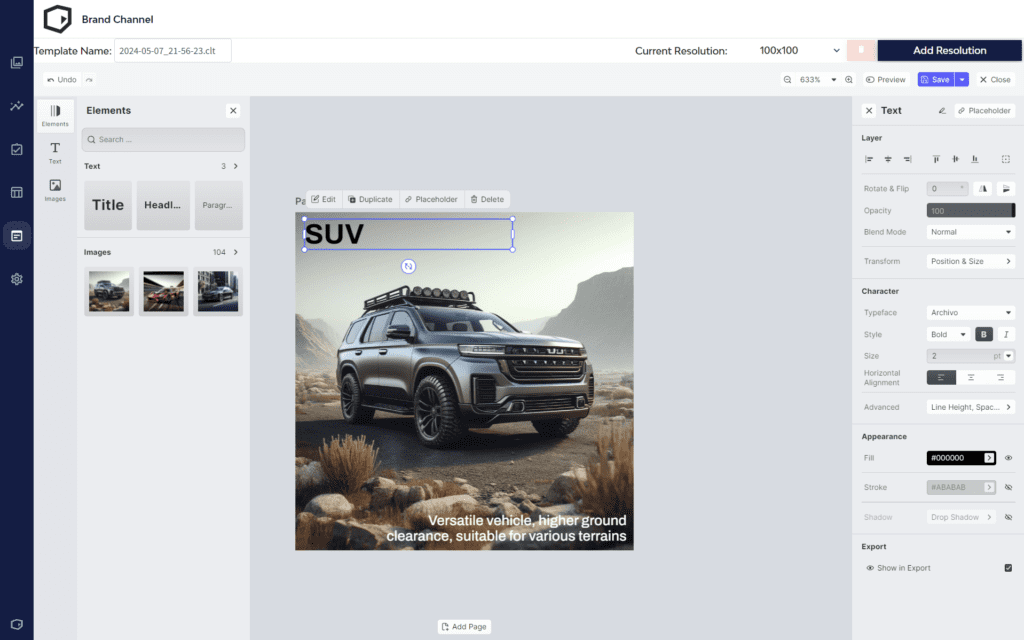
DemoUp Cliplister’s Dynamic Template and Creative Editor lets you easily create and scale assets directly in the DAM. This powerful tool gives users the flexibility to design product listings and category pages that update automatically based on dynamic URL links and parameters.
The template editor can even be customised so that products are featured dynamically in your shop based on current stock. For instance, once a product is out of stock, the next available product will feature in the template.
But that’s not all. Brands can also use the tool to create product images in bulk using a single template – which comes in handy for localisation purposes or campaigns featuring several products.
Dynamic Media Delivery
DemoUp Cliplister’s Dynamic Media Delivery optimises images and videos with advanced compression technology, reducing file sizes by up to 70% without sacrificing visual quality.
This streamlined delivery not only enhances user experience with faster load times but also improves SEO performance by ensuring media-rich pages load quickly.
Backed by a multi-CDN network, it offers unmatched reliability and performance – key for occasions like Black Friday or Mother’s Day when traffic is at its peak.
DemoUp Cliplister Best Features
- Upload, organise, store, manage, share, and publish content from a central location.
- Syndicate and curate content directly to the digital point of sale with minimal effort.
- Implement the system into any existing workflow using the system headlessly with its powerful API, or leverage its user-friendly interface.
- Generate and localise images in bulk for promotional campaigns and dynamically feature products in shops based on availability with a dynamic template and creative editor.
- Optimise images at scale and deliver them via a reliable and redundant multi-CDN.
- Keep track of all previous versions and asset histories.
- Protect your assets with customisable user permissions and digital rights management features, and store them in secure ISO-27001 certified data centres.
- Track and optimise digital asset usage, deployment, and workflows.
DemoUp Cliplister Limitations
- No mobile app for on-the-go needs.
- Lack of features not relevant for e-commerce brands or shops.
DemoUp Cliplister Pricing
Because we provide only the tools and services you need, pricing is available upon request. Feel free to send us your RFIs or RFPs via our contact page!

Take Control of Your Product Content
The only DAM designed with e-commerce in mind.
2. Bynder – Best DAM Software for Brand Management
Bynder is a highly regarded digital asset management platform for organising, storing, and distributing brand assets. Whether managing a small team or collaborating with global partners, Bynder consolidates everything in one location, making it easier to maintain control over a brand’s content across all channels.
Particularly useful when coordinating with multiple agencies, the platform ensures brand guidelines are consistently applied. The central hub allows users to store, tag, and distribute assets efficiently, preventing issues like version control or outdated materials being used.
A standout feature is Bynder’s user-friendly approach to brand asset management and automating repetitive tasks, such as metadata tagging. The collaborative features, including real-time editing and approval workflows, significantly reduce the time it takes to bring campaigns to market.
However, the platform would benefit from more advanced AI-powered features for content organisation, as the current automated tagging could be more intuitive, which leads some to look for Bynder alternatives.
Bynder Best Features
- Manage and distribute digital assets from a central hub with ease.
- Simplify branding with customisable templates and on-brand asset creation.
- Collaborate in real-time with shared workspaces and approval workflows.
- Automate metadata tagging for faster organisation.
- Ensure brand consistency across all platforms with dynamic brand guidelines.
Bynder Limitations
- Limited AI features for content organisation.
- The platform can be overwhelming for new users due to its wide range of features.
- Customisation options, while extensive, can be challenging for non-technical users.
Bynder Pricing
Bynder recently moved to a modular approach to pricing, which means you’ll have to get in contact in order to get a quote.
Bynder Ratings and Reviews
- G2: 4.5/5
- OMR: 4.4/5
“Bynder has changed how we manage our marketing assets. Before Bynder we had to search for these assets in multiple locations. People were constantly asking me to send them marketing assets. Now they can easily find them on their own.” – G2 Crowd
“We’ve found that user feedback on improvement requests is not always prioritised, which can slow down the pace of updates and enhancements. Additionally, the print templates are not as user-friendly as we would like. They can be cumbersome to use, making it challenging for teams to create materials efficiently. A more intuitive design would significantly enhance the user experience.” – G2 Crowd
3. Canto – Best DAM Software for Collaboration
Canto is a user-friendly DAM platform built for teams to efficiently organise, manage, and share digital content. With its intuitive interface, Canto makes it easy to upload, search, and distribute assets with minimal training required.
Its customisable folder structure and smart albums streamline asset organisation, making content easy to find and manage, ideal for teams with large volumes of content. Seamless integration with tools like Adobe Creative Cloud enhances workflows, keeping creative projects on track.
While Canto is a powerful DAM solution, many users report that its interface can be clunky and difficult to navigate, which may slow down workflows.
Additionally, some find that Canto’s pricing is steep, particularly for smaller teams or businesses, leading many to explore more cost-effective options. If you’re looking for alternatives that offer similar features at a better price point, check out our Canto alternatives article for more details.
Canto Best Features
- Intuitive interface with customisable folder structures and tagging.
- Powerful search functionality with smart albums for automatic organisation.
- Seamless integration with Adobe Creative Cloud and Microsoft Office.
- Easy sharing and collaboration with external partners via branded portals.
- Automatic file versioning and backups to prevent loss of critical assets.
Canto Limitations
- Lacks advanced AI-powered tagging features.
- Some users may find the customisation options limited compared to more complex DAM software.
- The platform’s basic reporting and analytics tools could be improved.
Canto Pricing
Like most entries in the enterprise DAM software space, you must contact Canto for pricing information.
Canto Ratings & Reviews
- G2: 4.3/5
- OMR: Not Listed
What Users Think About Canto
“I would like to see some better user interface be developed in Canto. Sometimes it seems like I need to make extra clicks that could be consolidated into one click or key command.” – G2 Crowd
▶️ Compare Canto vs DemoUp Cliplister!
4. Aprimo – Best DAM Tools for Marketing & Operations
Aprimo is an enterprise-level digital asset management platform that offers a comprehensive suite of tools to manage content, marketing, and operations at scale. It’s ideal for large organisations that need to streamline complex workflows, automate content distribution, and ensure brand consistency across multiple channels.
Aprimo’s platform is known for its AI-driven content tagging, robust workflow automation, and deep customisation options. Teams can collaborate seamlessly on asset creation, review, and approval, ensuring faster time-to-market for campaigns while maintaining quality control.
It also features comprehensive content intelligence, productivity management, and marketing spend optimisation tools.
However, Aprimo is quite complex and requires significant time and resources to properly set up. This complexity also leads to a step learning curve which makes it less accessible to those without technical backgrounds.
Aprimo Best Features
- AI-driven content tagging and metadata management.
- Advanced workflow automation for large teams.
- Powerful collaboration tools for reviews and approvals.
- Seamless integration with marketing and content management systems.
- Detailed analytics and reporting to track asset performance.
Aprimo Limitations
- The platform’s complexity may require a steeper learning curve.
- Customisation options can be overwhelming for smaller teams.
- Pricing is on the higher end compared to some DAM solutions.
Aprimo Pricing
Custom pricing based on enterprise needs.
Aprimo Ratings & Reviews
- G2: 4.3/5
- OMR: 3.3/5
What Users Think About Aprimo
“It contains every step (task) from ideation through cataloguing. It allows us to track every process within the workflow to later measure and improve.” – G2 Crowd
“Very complicated and convoluted. Hard to use without training. Far too many input options and far too many functions, which overloads me as a user.” – OMR (translated from German)
Aprimo more like Apri-no? We have Aprimo alternatives for you
5. Cloudinary – Best Digital Asset Management Software for Developers
Cloudinary is a cloud-based digital asset management platform, known for its strong focus on managing and optimising visual media like images and videos. It’s widely used by developers and creative teams to automate media delivery, optimise assets for web performance, and seamlessly integrate into existing workflows via its API.
Cloudinary’s real-time media transformation tools help businesses deliver fast-loading, high-quality media across all devices, making it a solid choice for brands prioritising visual content.
However, while Cloudinary excels in media optimisation, its DAM functionality can feel limited compared to more feature-rich platforms. Teams looking for extensive collaboration, approval workflows, or advanced content management capabilities might find it lacking.
Its technical setup can also be challenging for non-developers, requiring a good level of technical expertise to fully leverage its API-driven system, leading many to look for alternatives to Cloudinary.
Cloudinary Best Features
- Powerful real-time image and video optimisation.
- API-based media management for seamless integration with existing workflows.
- Media transformations on-the-fly for faster web performance.
- Global content delivery network (CDN) for fast media delivery across all devices.
- Automatic media compression without compromising quality, improving SEO.
Cloudinary Limitations
- Limited traditional DAM features like collaboration and approval workflows.
- The platform can be difficult for non-technical users to navigate and set up.
- Focused more on media optimisation than full content management.
Cloudinary Pricing
- Free plan available with limited storage and bandwidth.
- Paid plans are based on usage, with custom pricing for enterprise needs.
Cloudinary Ratings & Reviews
- G2: 4.4/5
- OMR: Not Listed
What Users Think About Cloudinary
“Cloudinary’s pricing can skyrocket, especially with large files and high traffic. We experienced a bill increase by 10x due to a single large file.” – G2 Crowd
6. Scaleflex – Best for DAM System for Media Heavy Workflows
Scaleflex is a flexible DAM platform designed to optimise and manage media-heavy workflows. Known for its strong focus on performance, Scaleflex offers tools for media compression, real-time optimisation, and scalable content delivery, making it ideal for businesses that handle large volumes of images and videos.
Its platform supports seamless collaboration and integrates well with other tools, providing teams with an efficient solution to manage, edit, and distribute assets across different channels.
Where Scaleflex truly shines is in its performance optimisation. It helps reduce media load times without sacrificing quality—crucial for improving website speed and search engine rankings. Its CDN (content delivery network) ensures that assets are quickly delivered globally, making it a great choice for companies prioritising speed and scalability in media delivery.
However, Scaleflex can feel limited in terms of advanced DAM features like extensive metadata management or workflow automation, which might make it less appealing for teams needing a more comprehensive content management solution like DemoUp Cliplister offers. The setup process may also be challenging for users without a technical background.
Scaleflex Best Features
- Real-time media optimisation for faster web performance.
- Powerful compression tools that maintain high image and video quality.
- Global content delivery network (CDN) for fast media distribution.
- Easy integration with existing tech stacks and cloud solutions.
- Collaboration features for seamless media management across teams.
Scaleflex Limitations
- Lacks advanced DAM features like workflow automation and detailed metadata management.
- Setup can be challenging for non-technical users.
- Focuses more on media optimisation than full asset management.
Scaleflex Pricing
Custom pricing based on business needs and media usage.
Scaleflex Ratings & Reviews
- G2: 4.6/5
- OMR: Not Listed
What Users Say About Scaleflex
“We had no problems integrating Cloudimage into our web pages using the API. We’ve utilised the dashboards to monitor our processing quotas and find them easy to use and intuitive. Overall satisfied with the support and ease of use.” – G2 Crowd
“It is somewhat unclear how to delete all images from the CDN, and when you do, it seems that if there are any active linked images somewhere, their delivery continues, which is not what you would expect when deleting content from the CDN.” – G2 Crowd
7. CELUM – Best for Complex Digital Asset Management Needs
CELUM is a DAM solution designed for large businesses needing control over their content. It is ideal for companies managing large libraries of digital files, offering tools that make it easier to organise, share, and collaborate on content across different teams.
CELUM’s standout features include tools for organising assets, automating workflows, and sharing content between departments. It allows multiple users to work together on content, speeding up review and approval processes.
However, CELUM’s complexity may be challenging for smaller teams or those without technical support. It can take time to set up and may require training to use effectively, making it less suited for companies looking for a simpler, plug-and-play solution.
CELUM Best Features
- Organise large content libraries with advanced metadata tools.
- Automate content workflows to streamline approval processes.
- Share content easily between teams and departments.
- Collaborate on content in real-time, improving efficiency.
- Secure, cloud-based management with strong permissions controls.
CELUM Limitations
- Can be complex to set up and learn.
- May require technical expertise for customisation.
- Smaller teams may find it too advanced for their needs.
CELUM Pricing
- Online Proofing Pro: €24.90/month
- Enterprise DAM Tool: Pricing available via CELUM’s website.
CELUM Ratings & Reviews
- G2: 4.1/5
- OMR: 4.2/5
What Users Think About CELUM
“The user interface is not necessarily modern, but functional. It is a pity that there is no possibility to create versions of two assets that are already in CELUM.” – G2 Crowd
“CELUM offers a perfect fit for our internal customers’ needs and also from an IT point of view regarding its architecture and maintainability.” – G2 Crowd
Not getting what you need to see from CELUM? We have CELUM alternatives for you
8. Brandfolder by Smartsheet – Best DAM System for Small & Mid-Sized Businesses
Brandfolder is a user-friendly digital asset management platform designed to help businesses organise, store, and share their digital content with ease. It is ideal for teams looking to manage assets like images, videos, and documents efficiently while maintaining brand consistency across channels.
Brandfolder stands out for its intuitive interface, making it easy for both technical and non-technical users to quickly find and share assets. It offers smart tagging and search features, which help users locate the right content faster. Additionally, Brandfolder supports collaboration, allowing teams to work together on projects and share assets securely with external partners.
However, while Brandfolder is great for ease of use, larger enterprises or teams with more complex needs might find the platform’s features somewhat limited compared to more advanced DAM systems, which leads many people to seek alternatives to Brandfolder.
Brandfolder Best Features
- Easy-to-use interface for storing and organising digital assets.
- Smart tagging and search tools for quick access to files.
- Collaboration features to share assets securely with teams and partners.
- Supports maintaining brand consistency across different channels.
Brandfolder Limitations
- May lack advanced features for large, complex teams.
- Some users may find the customisation options limited.
- Best suited for small to mid-sized businesses looking for simplicity.
Brandfolder Pricing
Custom pricing based on business needs.
Brandfolder Ratings & Reviews
- G2: 4.5/5
- OMR: 4.0/5
What Users Think About Brandfolder
“Brandfolder is extremely easy to use. Even for colleagues who have little experience with DAMs or similar applications, the implementation process was easy for them. Brandfolder also looks and feels sleek, making sharing assets within and outside the company a point of pride.” – G2 Crowd
“Brandfolder is costly. I don’t particularly appreciate how Brandfolder will present tools as solutions but in reality, you have to upgrade your plan type to get the actual benefit of that tool, via another tool.” – G2 Crowd
9. Wedia – Best DAM Software for Unified Marketing Resource Management
Wedia is a DAM platform designed for large businesses that need to organise and share content across different channels. It helps brands keep their content consistent by offering tools for managing assets and distributing them efficiently.
Wedia’s key strengths include automating content workflows, making it easier to create, review, and approve content. Its analytics tools also help track how assets are performing, providing valuable insights for teams.
However, Wedia’s wide range of features might be overwhelming for smaller teams. It can take time to set up and requires some technical knowledge to use effectively.
Wedia Key Features
- Automates content workflows for easier creation and approval.
- Detailed analytics for tracking asset performance.
- Multi-channel content distribution for consistent branding.
- Secure cloud-based storage with access controls.
Wedia Considerations
- May be too complex for smaller teams.
- Setup and customisation can take time.
- Best for larger companies with more advanced content needs.
Wedia Pricing
Custom pricing based on enterprise requirements.
Wedia Ratings & Reviews
- G2: 4.6/5
- OMR: 4.5/5
What Users Think About Wedia
“Due to the customisation of our DAM system, annual updates come with additional costs. In addition, the extensive customisation options in the backend are great, but should only be used by marketers and administrators (a trained group). The huge range of functions cannot be fully utilised. As a result, configuring the programme took longer.” – OMR (Translated from German)
10. Acquia DAM – Best DAM System for CMS Integrations
Acquia is known for its expertise in providing tools and services for managing, delivering, and optimising digital experiences. Acquia DAM specifically focuses on the management of digital assets within the broader context of digital experience platforms.
Acquia DAM typically offers features related to the organisation, storage, retrieval, and distribution of digital assets such as images, videos, documents, and other media files. These assets are crucial for creating engaging and consistent digital experiences across various channels and platforms.
11. Adobe Experience Manager – Best DAM Solution for Personalised Experiences
Adobe Experience Manager (AEM) Assets is a comprehensive digital asset management solution that is part of the Adobe Marketing Cloud, which is now known as Adobe Experience Cloud.
AEM is designed to help organisations create, manage, and optimise digital customer experiences across various channels, including web, mobile, email, and social media.
AEM DAM is a core component of the Adobe Experience Manager that specifically focuses on managing and organising digital assets within the broader context of creating and delivering digital experiences.
Adobe more like Adon’t? We have Adobe DAM alternatives for you
12. Frontify – Best Digital Asset Management Software for Brand Management
Frontify is a brand asset management platform with a strong focus on brand guidelines and content review. It’s unique use of customised portals makes it a strong contender in the brand asset management market.
However, users complain that the scope of Frontify is very limited compared with other DAM platforms. Read our Frontify alternatives article for more information.
13. MediaValet – Best DAM for Integration with Creative Tools
MediaValet is a cloud-based digital asset management platform designed to help organisations store, manage, and distribute their digital assets securely. Built on Microsoft Azure, it offers enterprise-grade security and scalability, making it ideal for organisations handling large volumes of digital content such as images, videos, documents, and creative files.
MediaValet’s key features include AI-powered search capabilities, automated metadata tagging, and robust collaboration tools, allowing teams to work more efficiently on content creation and distribution.
However, some users complain about things like poor customer support, the inability to rename files within the program (which means you have to delete, rename the file on your local desktop, and reupload), and a poor UX.
14. ContentServ – Best DAM Software for Cross-Team Collaboration
Contentserv’s DAM system focuses on centralising and managing digital assets, particularly for businesses with complex product catalogues. While it offers product information management capabilities, users report the setup process is cumbersome and time-consuming due to its extensive requirements.
Its features, such as automated workflows and metadata management, aim to streamline asset organisation, but the platform can feel overly complicated for many teams. Overall, Contentserv DAM may suit businesses with highly specific needs, though it can present challenges in terms of usability and initial configuration.
Compare DemoUp Cliplister vs Contentserv!
15. Salsify – Best for Simplifying Digital Asset Organisation and Delivery
Salsify’s Digital Asset Management (DAM) solution, integrated into its product experience management (PXM) platform, helps brands centralise, organise, and distribute rich media assets like images and videos. Designed for e-commerce, it ensures assets meet retailer requirements while supporting collaboration through tagging, search, and easy updates.
A key advantage of Salsify’s DAM is its integration with PXM tools, linking assets directly to product information for consistent, cohesive content delivery.
However, as part of a broader ecosystem, it may not suit businesses seeking a stand-alone DAM solution. It’s best suited for brands invested in end-to-end product experience management, particularly in e-commerce.
Wrapping Up
Selecting the right digital asset management software is essential for organisations seeking to optimise their asset management workflows. The featured DAM software options – DemoUp Cliplister, Bynder, Canto, Aprimo, and Cloudinary – offer powerful features and functionalities to suit various needs.
Evaluate each software based on your organisation’s requirements, request demos or trials. This helps you make an informed decision that will streamline your DAM processes and enhance productivity across your teams.
Want to know more about the full range of DemoUp Cliplister products and services? Visit our homepage.
The best digital asset management software is the one that best suits your individual needs. You can learn more about digital asset requirements in our guide on how to choose a digital asset management system.
There are several software options used for asset management, and the choice often depends on the specific needs and requirements of the organisation. Here are some popular asset management software providers:
- DemoUp Cliplister
- Adobe AEM DAM
- Bynder
- Canto
- Cloudinary
Digital Asset Management (DAM) software is designed to efficiently organise, store, retrieve, and distribute digital assets within an organisation. Learn more in our guide to digital asset management.
Choosing the right Digital Asset Management (DAM) system for your organisation involves careful consideration of your specific needs, workflows, and goals. If you want more guidance on what to look for, check out our DAM Playbook.
While AEM DAM focuses on helping organisations create and deliver digital experiences, the DemoUp Cliplister DAM has a deep focus on enterprise e-commerce. As a specialist solutions company, DemoUp Cliplister can custom tailor your DAM to fit any e-commerce application.
Better Content. More Sales.

Fill out the form to discover our end-to-end eCommerce content solutions for brands & shops

